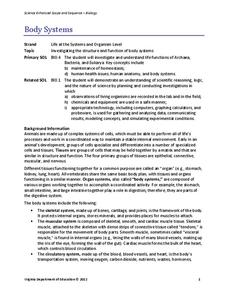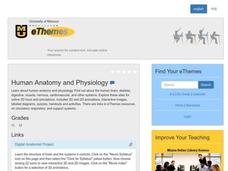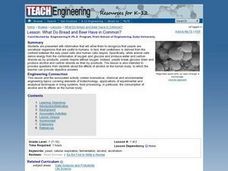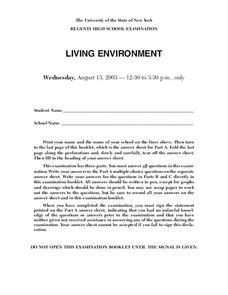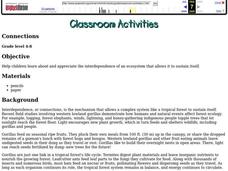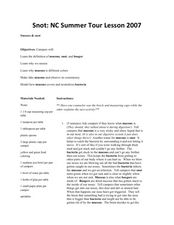Curated OER
Traveling Through the Digestive System
Second graders learn about how the food is broken down in our bodies and the job of each body part involved in our digestive system. The utilize the CD ROM game, "Body Works." This wonderful game takes pupils through the human body's...
Virginia Department of Education
Body Systems
The human body is an amazing thing! Explore the body with your high school class as they investigate each system in detail. They learn components of each organ system and disease processes that can negatively affect general health and...
Curated OER
Earthworm Animation
Students use animation to create their own earthworm catching and eating its prey. They must draw storyboards before they start on the animation.
Curated OER
And The Beat Goes On...!
Students explore the circulatory system. They observe a dissection of a heart and view the path that blood takes through the heart and the circulatory system. Students identify the structures and functions of the heart. They write a...
Curated OER
Stop the Bleeding
Learners explore various parts of the heart and blood vessels . They begin with an overview of the components of the cardiovascular system. They see a cross section of an artery and watch how a blood clot develops.
Curated OER
Science: Comparing Beer and Bread
Students compare and contrast cellular respiration in yeast and plant and animal cells. After discovering the role of yeast in making beer and bread, they describe the short and long term effects of alcohol on the nervous and digestive...
Curated OER
Carnivorous Plants
Learners examine how carnivorous plants get their nutrients from animals. In this food web lesson plan students examine how the plants attract their prey and are given many onilne sources to research.
Curated OER
Fun Faces of Wisconsin Agriculture: Curley's Beef Fast Facts
Students explore animal slaughter by researching the Wisconsin beef industry. In this meat statistics lesson, students practice using different math functions to identify how many burgers or sports equipment can be made from one...
Green Learning
Build Your Own Biogas Generator
Where this is not exactly a lesson plan, it is a terrific outline of how to generate biogas from an animal manure sample. If you are up for the challenge, the generator can be built by your class as a concluding project at the end of an...
Curated OER
Dino Dung!
Students examine how there is more to poop than they think! After reading through material, they answer a series of questions on coprolite, and explore the diet and physical attributes of dinosaurs, as well as their environment.
Curated OER
Living Environment
In this environmental lesson students complete a series of multiple choice and short answer questions on animal populations, cell structure and chromosomes.
Curated OER
The Living Environment
Ninth graders compare and contrast animals according to their four systems. For this living environment lesson students complete their assignment on the animal they were given and present their findings to the class.
Curated OER
Adaptations
Eighth graders choose an animal and research its various adaptations using
their information, 8th graders create an informational tri-fold brochure or newsletter. They should include facts about the animal's adaptations as well as...
Curated OER
Cows, Worms, and Compost
Students study decomposition. In this decomposition instructional activity, students discuss the background information about decomposition. Students then complete the 'Chew It Twice' worksheet.
Curated OER
How do Hypotonic, Hypertonic, and Isotonic Solutions Affect the Water Movement of a Cell?
After removing the shell from a raw egg, cell biologists soak the egg in either a hypotonic, hypertonic, or isotonic corn syrup solution. They calculate the percent change in mass and compare it to the strength of the solution in a...
Curated OER
CONNECTIONS
Students study the interdependence of an ecosystem that allows it to sustain itself. They examine the Western lowland gorillas for an example.
Curated OER
The Perfect Cow?
Young scholars examine how cattle have evolved through natural selection and selective breeding. For this natural selection lesson students compare and contrast natural and artificial selection.
Curated OER
What is Coral?
Students discuss what they know about coral reefs and are introduced to the importance of preserving coral reefs. In this coral reef lesson, students make connections between coral ecology in the classroom and in the real environment...
Curated OER
The Three Worm Phyla
Ninth graders examine the three worm phyla. In this classification lesson, 9th graders observe, compare and contrast the planarian, tapeworm, and fluke.
Curated OER
Mussel Anatomy Lesson Plan
Students identify the parts and functions of a mussel. They explain how its physical adaptations help it survive in its habitat. They label the parts as a quiz to complete the lesson.
Curated OER
Snot: NC Summer Tour Lesson 2007
Students study various aspects of mucous. In this mucous lesson, students investigate the purpose of mucous. Students create fake mucous.
Curated OER
9 Phyla of the Animalia Kingdom.
Young scholars identify characteristics of all 9 phyla of the Animalia Kingdom. They create a table of the 9 phyla and research a representative organism for each.
Curated OER
Beef and Beef By-Products
Students examine the various types of beef and the many uses of its by-products. They increase their knowledge by playing a game of "beef bingo."They discuss what parts of beef animals are their by-products.

